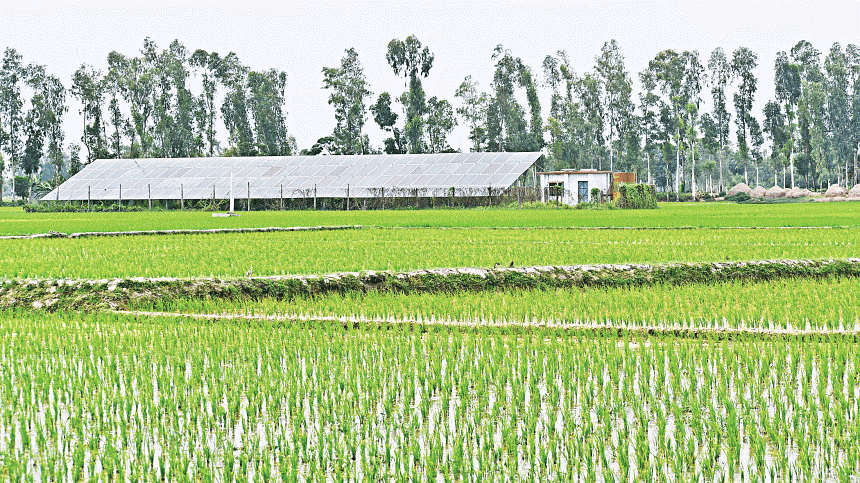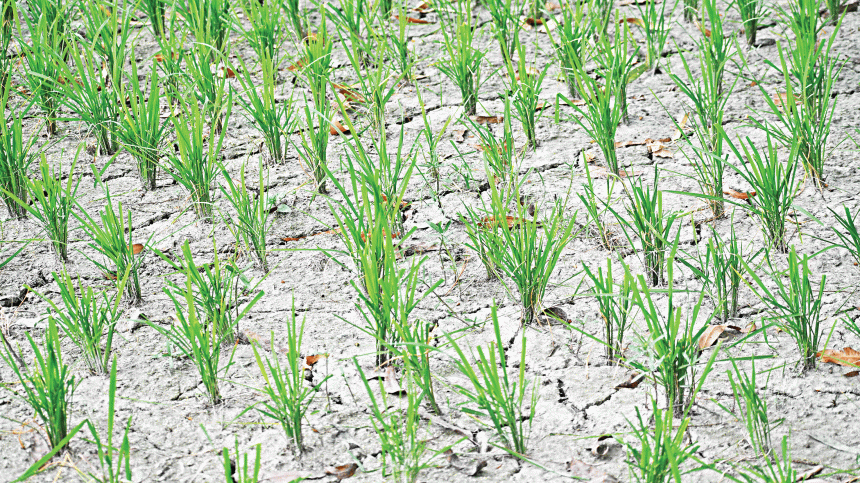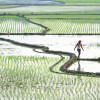Solar irrigation pumps: a saviour amid drought

Farmers in Bangladesh have been left displeased with lower rainfall during the monsoon season this year as they were unable to plant Aman paddy on time due to a lack of natural irrigation.
As such, farmers are now facing additional charges for growing the crop as they are having to spend extra on electricity and diesel to power their irrigation pumps.
However, the situation is different at farms where solar irrigation pumps (SIPs) are available as they were able to sow the crop 15-20 days ago while keeping costs lower than farms using electric or diesel pumps.
Besides, it goes without saying that those who planted paddy at the right time will surely get better yields, according to agriculture officials.
As per data of the Sustainable and Renewable Energy Development Authority (SREDA), solar power contributes 80.4 percent, or about 960 megawatts (MW), of the renewable energy in Bangladesh.
And of the 1,194 MWs of renewable energy produced each year, some 2,877 SIPs across the country account for 52.29 MWs so far.
The Infrastructure Development Company Ltd has installed 1,523 SIPs, generating 42 MWs, while the Barind Multipurpose Development Authority set up 792 units.

According to the Department of Agricultural Extension in Gaibandha, the target area for cultivating Aman paddy in the district is 1.27 lakh hectares.
But as of August 2, just 31,780 hectares of land had been brought under cultivation.
According to the Bogura DAE, they aim to cultivate Aman paddy on 1.83 lakh hectares this season.
Local farmers had planted the crop on a total of 72,450 hectares as of August 2, with most of the land being used now under irrigation.
Millat Hossain, a farmer of Palashi village in Bogura's Shibganj upazila, planted paddy using SIPs on two bighas of land.
"Farmers in our village cultivated Aman with solar power around 15-20 days ago. We didn't have to wait for rainwater. The two-bigha land is being irrigated for the entire season for just Tk 800 to Tk 1000," Millat said.
Ruhul Amin, an owner of a solar powered pump in Sultanpur village of Bogura Sadar Upazila, said Aman paddy has been cultivated on 25 bighas of land using his irrigation system.
"As there was less rain this time, I am charging Tk 1,200 per bigha being irrigated this season," he added.
On the other hand, Abdur Rauf, the owner of a deep tube-well in Rajos village under Gobindganj upazila of Gaibandha, said people like him are charging Tk 1,000 to irrigate each bigha of land just thrice during the season.
Abdul Baki, a farmer of Daridah village in Shibganj upazila of Bogura, said the soil has dried up due to the lack of rain, meaning that it takes a lot of water to cultivate one bigha of land.
"To irrigate and sow one bigha, we have to spend Tk 600-700 for watering the first time. But for the whole season, we will need more than Tk 1,000 extra for irrigation," he added.
According to the Bogura DAE, there are 79 SIPs in the district, of which 60 are operational.
And with these 60 pumps, a total of 285 hectares of Aman paddy has been cultivated.
Similarly, the Gailbandha DAE said the 33 SIPs were used to cultivate 30 hectares of paddy so far.
"Farmers have time till August 20 for early Aman cultivation," said Md Matlebur Rahman, deputy director of the Bogura DAE.
"But when seedlings cross 30 days of age, the yield will definitely decrease according to the variety, which is why farmers are cultivating the crop using irrigation as soon as possible," he added.
Matlebur also said that SIPs are a boon for farmers.
"If there is a solar pump, there is no need to wait for rain. Crops can be grown at the right time at a low cost. Besides, the pumps are environment-friendly," he added.
Md Abu Zafar Sujan, area manager of Salek Solar Power Ltd in Bogura, said the government wants to get 10 percent of the country's demand for electricity from renewable sources by 2030.
"But due to the rising cost of solar pumps, many power companies are not able to install them even when contracted by the government for this purpose," he added.
According to the International Water Management institute, renewable energy contributed only 3.6 percent of Bangladesh's total installed electricity capacity in 2022.
Off grid SIPs contributed about 8 percent, or 50.4 MWs, of the total installed solar capacity that year.
Till mid-2022, there were 2,716 SIPs in the country, primarily in the boro-dominated northwest region.
The SIP sector in Bangladesh is currently at a nascent stage. However, there are ambitious targets for SIPs in Bangladesh.
In parity with its revised NDC targets, the government has unconditionally set a target of 176 MW of solar irrigation and an additional 164 MW conditional upon external support as a part of its emission mitigation actions.

 For all latest news, follow The Daily Star's Google News channel.
For all latest news, follow The Daily Star's Google News channel. 








Comments